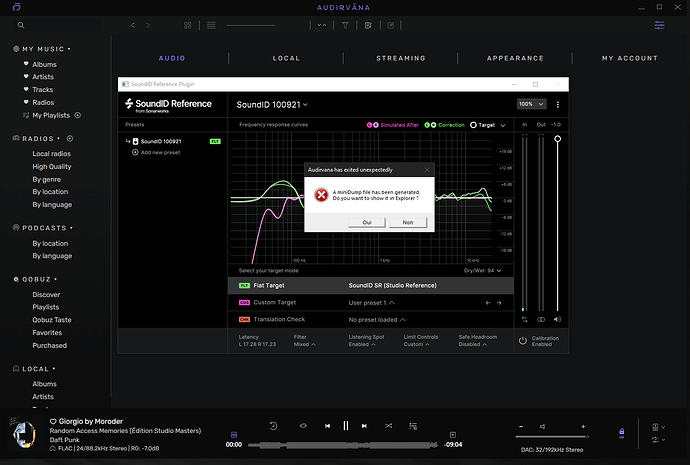oh ok ! - thank you Jacob
note : it works perfectly when realtime control is OFF
Audirvana Studio 1.7.2 (10702)
Windows 10 (19044) with 32GB physical RAM
Connected account:
SIGNAL PROCESSING:
Polarity Inversion:
Globally: OFF
Per track: ON
Effects plugins ACTIVE in realtime mode
VST3 plugin #0: C:\Program Files\Common Files\VST3\SoundID Reference VST3 Plugin.vst3
ClassID: 5653545053546A736F756E6469642072
VST3 plugin #1: None
VST3 plugin #2: None
VST3 plugin #3: None
UPSAMPLING:
SoX with device max frequency upsampling
SoX filter parameters
Bandwidth at 0dB = 89.7115%
Filter max length = 30000
Anti-aliasing = 100
Phase = 50%
AUDIO VOLUME:
Max allowed volume: 100
Replay Gain: by album
SW volume control: OFF
LIBRARY SETTINGS:
Sync list: 1 folders
AUTO: B:\MUSIQUE FLAC
Library database path: C:\Users\oleop\AppData\Local\Audirvana\Audirvana\AudirvanaDatabase.sqlite
Remote Control server:
Listening on 192.168.0.3 on port 54788
ACTIVE STREAMING SERVICES
Qobuz: Connected as
=================== AUDIO DEVICE ========================
Max. memory for audio buffers: 11804MB
Local Audio Engine: ASIO ASIO 2 driver version 1106
Preferred device:
Universal Audio USB
Model UID:Universal Audio USB
UID:Universal Audio USB
Currently playing in Integer Mode:
Device: 6ch 32bits Integer, 24 bytes per frame 192kHz
Active Sample Rate: 192kHz
Bridge settings:
Sample rate limitation: none
Sample rate switching latency: none
Limit bitdepth to 24bit: OFF
Mute during sample rate change: ON
Selected device:
Local audio device
Universal Audio USB
Manufacturer:
Model Name: Universal Audio USB
Model UID: Universal Audio USB
UID: Universal Audio USB
6 available sample rates up to 192000Hz
44100
48000
88200
96000
176400
192000
Volume Control
Physical: No
Virtual: No
MQA capability
Auto-detect MQA devices: No
Not a MQA device, user set to not MQA
DSD capability: Unhandled
Device audio channels
Multichannel: 6 channels
Preferred stereo channels L:0 R:1
Channel bitmap: Ox3f, layout:
Channel 0 mapped to 0
Channel 1 mapped to 1
Channel 2 mapped to 2
Channel 3 mapped to 3
Channel 4 mapped to 4
Channel 5 mapped to 5
Audio channels in use
Number of channels: 6
Use as stereo device only: Yes
Simple stereo device: No
1 output streams:
Number of active channels: 2, in 1 stream(s)
Channel #0 :Stream 0 channel 0
Channel #1 :Stream 0 channel 1
6 ch Integer PCM 32bit little endian 44.1kHz
6 ch Integer PCM 32bit little endian 48kHz
6 ch Integer PCM 32bit little endian 88.2kHz
6 ch Integer PCM 32bit little endian 96kHz
6 ch Integer PCM 32bit little endian 176.4kHz
6 ch Integer PCM 32bit little endian 192kHz
Local devices found : 5
Device #0: ASIO Avid Driver Manufacturer: Model UID: ASIO Avid Driver UID: ASIO Avid Driver Model Name: ASIO Avid Driver
Device #1: Generic Low Latency ASIO Driver Manufacturer: Model UID: Generic Low Latency ASIO Driver UID: Generic Low Latency ASIO Driver Model Name: Generic Low Latency ASIO Driver
Device #2: Universal Audio Apollo FireWire Manufacturer: Model UID: Universal Audio Apollo FireWire UID: Universal Audio Apollo FireWire Model Name: Universal Audio Apollo FireWire
Device #3: Universal Audio Thunderbolt Manufacturer: Model UID: Universal Audio Thunderbolt UID: Universal Audio Thunderbolt Model Name: Universal Audio Thunderbolt
Device #4: Universal Audio USB Manufacturer: Model UID: Universal Audio USB UID: Universal Audio USB Model Name: Universal Audio USB
UPnP devices found : 0

